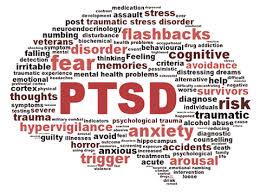Post-traumatic stress disorder, or PTSD, is a mental health condition that can be caused by exposure to any type of traumatic event. This includes exposure to physical or sexual assault, accidents, natural disasters, and war. One form of trauma that is often overlooked is cheating. If you have been cheated on, you may be wondering if you are experiencing PTSD. In this blog post, we will discuss what PTSD from cheating is and how to deal with it.
Contents
What Is PTSD?
 Post-traumatic stress disorder (PTSD) is a mental health condition that can be triggered by a terrifying event — either experiencing it or witnessing it. Symptoms may include flashbacks, nightmares, and severe anxiety, as well as uncontrollable thoughts about the event. Most people who go through traumatic events may have temporary difficulty adjusting and coping, but with time and good self-care, they usually get better.
Post-traumatic stress disorder (PTSD) is a mental health condition that can be triggered by a terrifying event — either experiencing it or witnessing it. Symptoms may include flashbacks, nightmares, and severe anxiety, as well as uncontrollable thoughts about the event. Most people who go through traumatic events may have temporary difficulty adjusting and coping, but with time and good self-care, they usually get better.
PTSD can occur at any age. It is often associated with soldiers returning from combat, but it can also happen to anyone who has experienced a traumatic event. According to studies, approximately 3.5% of adults in the United States have PTSD in any given year.
Trauma can be caused by many different types of events and things. Cheating is one of them. If you are dealing with PTSD from cheating, it is important to understand that you are not alone and that there is help available.
Can Cheating Cause You PTSD?
It might sound like something that would only happen to soldiers returning from combat, but post-traumatic stress disorder (PTSD) can occur after any type of trauma. And for some people, cheating can be a traumatic experience.
Because PTSD is still relatively misunderstood, there’s no official diagnosis for “PTSD from cheating.” But that doesn’t mean the condition isn’t real. For some, the relationship can feel like a personal warzone where trust has been destroyed and they’re left feeling isolated, anxious, and paranoid.
In fact, one study found that 40% of people who had been cheated on experienced symptoms of PTSD. And for women, the figure was even higher at 54%. The reason why cheating can be so traumatic is that it often leads to a loss of self-esteem and feelings of betrayal, abandonment, and worthlessness.
If you’re struggling to cope with the aftermath of your partner’s infidelity, it’s important to understand that you might be dealing with PTSD. So, do not just try to “get over it.” Seek professional help if you’re finding it hard to move on.
How Does It Look Like?
 PTSD from cheating might look like many things. A person could become more irritable, have trouble sleeping, or avoid anything that reminds them of cheating.
PTSD from cheating might look like many things. A person could become more irritable, have trouble sleeping, or avoid anything that reminds them of cheating.
It’s possible to feel like you’re in a fog and have a hard time concentrating on anything else. You might also find that you’re startled more easily. You might even experience physical symptoms like headaches or chest pain.
PTSD from cheating can vary in intensity. Some people only have mild symptoms while others find that their symptoms are so severe that they can’t function normally.
Let’s understand with an example, say you were in a relationship for 2 years and you found out your partner was cheating on you. You would likely experience a range of emotions, including betrayal, anger, sadness, and fear. You might also feel like you can’t trust anyone.
These feelings are all normal responses to being cheated on. However, in some cases, these feelings can become so intense that they lead to post-traumatic stress disorder (PTSD). So, therefore, PTSD from cheating can occur after someone experiences or witnesses a cheating incident.
What Triggers PTSD From Cheating?
It is important to understand that PTSD is not something that occurs within a moment after the event, there is often a long process that leads up to the diagnosis. It can be difficult for someone who has not experienced infidelity in their own life to understand how such a thing could lead to PTSD, but it is important to remember that everyone experiences and deals with trauma differently.
There are many different factors that can contribute to the development of PTSD after cheating, including:
- The severity of the betrayal
- The length of time it went on
- How close the relationship was
- Whether there was any physical or emotional abuse involved
And many other factors. It is also important to remember that each person’s experience is unique, so even if two people have similar experiences, they may still react differently.
So here are a few triggers that can lead to the development of PTSD from cheating:
Constant Reminders
It can be incredibly difficult to move on from an affair if you are constantly being reminded of it. If you live in the same house as your partner, this can be even more difficult. Every time you see them, or even hear their voice, it can trigger intense emotions and memories. This can make it very difficult to move on and heal from the betrayal.
Lack of Closure
Another trigger for PTSD from cheating is the lack of closure. If you were not able to confront your partner about the affair, or if they denied it, this can leave you feeling unresolved. This can be especially difficult if there are still secrets being kept, or if you feel like your partner is still hiding things from you. This lack of closure can make it very difficult to move on.
Feeling of Betrayal
This is probably the most common trigger for PTSD from cheating. The feeling of betrayal can be incredibly overwhelming and can lead to a feeling of distrust and suspicion. This can be especially difficult if you have a hard time trusting people in general. The feeling of betrayal can make it very difficult to move on and trust again.
Guilt
Another common trigger for PTSD from cheating is guilt. This can be a result of feeling like you could have done something to prevent the affair, or feeling like you are somehow responsible for it. This guilt can make it very difficult to move on and forgive yourself.
Shame
Shame is another common trigger for PTSD from cheating. This can be a result of feeling like you are not good enough, or feeling like you are somehow to blame for the affair. This shame can make it very difficult to move on and forgive yourself.
These are just a few of the triggers that can lead to PTSD from cheating. If you are struggling with any of these emotions, it is important to seek professional help. PTSD is a serious condition and should not be taken lightly.
How Long Is Infidelity Trauma?
 Now that we know what infidelity trauma is, how long does it last? Does it ever really go away?
Now that we know what infidelity trauma is, how long does it last? Does it ever really go away?
For some people, the effects of infidelity trauma can last a lifetime. The pain and betrayal they feel can be so deep and overwhelming that they never truly recover. They may never be able to trust another person again and they may forever feel broken.
For others, the effects of infidelity trauma may lessen over time but never fully go away. The hurt and anger they feel may fade, but the memory of what happened will always be there. They may be able to move on and have healthy relationships again. But they will always carry the scars of what happened.
And then there are those who are able to eventually move on from the trauma of infidelity. They are able to forgive their partner, rebuild trust, and have a healthy relationship again. For them, the pain may lessen over time and they may be able to look back on what happened as a learning experience.
No matter where you fall on the spectrum, know that you are not alone. There is help available if you feel like you are struggling to cope with the aftermath of infidelity. Just remember, it is possible to heal and move on.
How Can You Manage PTSD From Cheating?
There are a few key things you can do to manage PTSD from cheating. These include:
Talk to a therapist
A therapist can help you understand your emotions and teach you healthy coping mechanisms. There are several different types of therapy, each with its own benefits. For example, a few therapy options that might be beneficial for you are:
- Cognitive behavioral therapy
- Interpersonal therapy
- Prolonged exposure therapy
- Eye movement desensitization and reprocessing therapy
Join a support group
Support groups provide a space to share your experiences and connect with others who understand what you’re going through. For example, a group can provide an outlet to express the anger, sadness, and betrayal you may feel. It can also offer practical tips for dealing with anxiety, flashbacks, and other symptoms.
Write down your thoughts and feelings
Writing can be therapeutic. It can help you make sense of your emotions and work through them in a healthy way. So, if you’re feeling overwhelmed by post-traumatic stress from cheating, sit down and write out your thoughts and feelings. This will help you to process them in a constructive way.
Identify and avoid triggers
 It is one of the most important things you can do to manage your PTSD from cheating. A trigger is anything- a sound, a sight, a smell, a touch, a taste, or a thought- that sets off a memory of the event and makes your symptoms worse. So, recognizing your triggers is the first step in learning to control your reactions to them. There are three types of triggers:
It is one of the most important things you can do to manage your PTSD from cheating. A trigger is anything- a sound, a sight, a smell, a touch, a taste, or a thought- that sets off a memory of the event and makes your symptoms worse. So, recognizing your triggers is the first step in learning to control your reactions to them. There are three types of triggers:
- External triggers
- Internal triggers
- Verbal triggers
So be aware of what sets off your symptoms and do your best to avoid those triggers. If you can’t avoid them entirely, try to minimize your exposure to them.
Talk about what happened
Talking about your experience can be very helpful in managing your PTSD from cheating. It can be a way to process the events and make sense of them. It can also help you to feel supported and connected to others. Because when you have a friend or family by your side that understands what you’re going through, it can make a world of difference.
Practice self-care
After a breakup, you need time to heal, and taking care of yourself is the best way to start. There are various things you should do if you have post-traumatic stress disorder from cheating, and some of them include:
- Get rid of anything that reminds you of your ex
- Take some time for yourself
- Create new hobbies
- Go outside and explore
- Get enough sleep and stay active
So, these are a few things you should do if you’re suffering from post-traumatic stress disorder after your partner cheated on you. Taking care of yourself is the most important thing, and you should also try to find distractions so that you can move on from this tough time. If you think you need professional help, then don’t hesitate to seek therapy.
Conclusion
To conclude, PTSD from cheating might not be an officially recognized condition, but it is a very real experience for many people. If you are struggling with the aftermath of infidelity, know that you are not alone and there is help available. Seek professional counseling if needed, and lean on your support system of family and friends. With time, patience, and self-care, you will be able to heal and move on.
Therefore, understand this experience is very real and can have a significant impact on your life. Many people experience different symptoms, some of which might not be recognized by others.
If you want to know more about this topic, please contact Therapy Mantra. The therapist will help you understand your experience and give you resources to cope with it. Contact us today to learn more about our services. You can also book an online therapy session or download our free Android or iOS app.


